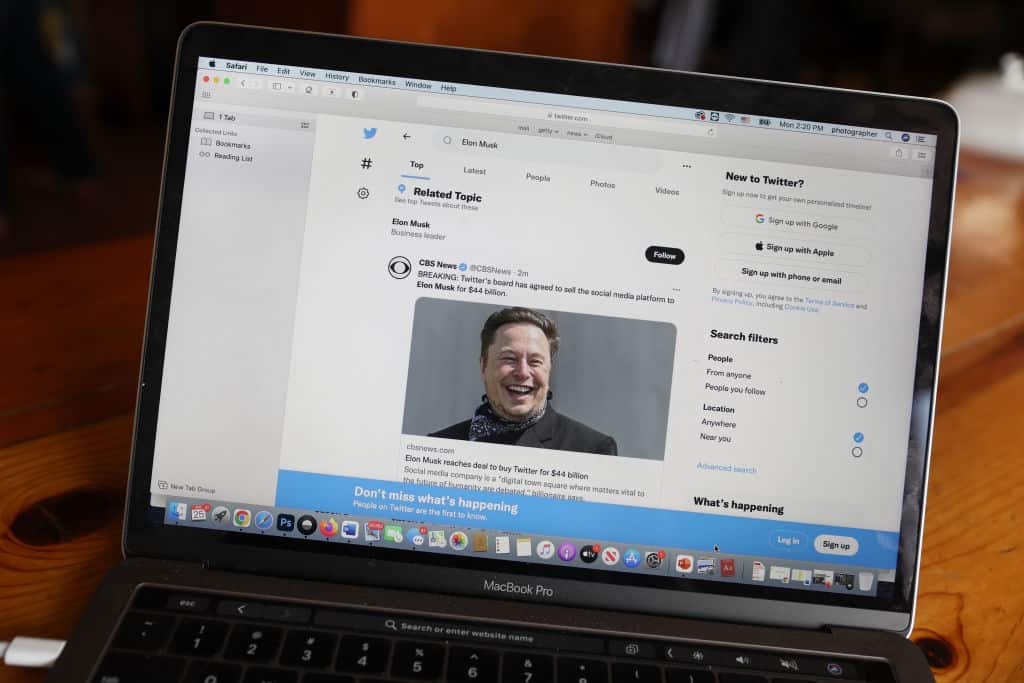Is Elon Musk’s US$44 billion Twitter takeover a publicity stunt that the wealthiest person in the world can get away with? Is Musk truly the free speech and decentralized advocate he claims to be? Or is this a strategic move out of a not-so-hidden playbook?
The truth is, Twitter is the place where minds change and markets rise and fall. Elon Musk’s Twitter takeover is a shake-up of epic proportions. But is this going to be good for society? Or is this just a billionaire making an ego play?
Musk’s history is a warning
Twitter isn’t the highest-performing social media channel. In fact, Twitter’s most consistent economic trait is that its profits are inconsistent. Elon Musk has more than enough wealth to buy a spuriously profitable company, but his history also reveals a pattern.
Musk will take unconventional and exorbitant risks if they’ll win him more market control. For example, Musk championed a lawsuit against Fisker, an electric car maker that was a direct Tesla competitor. But the grounds of the lawsuit didn’t shore up in court and forced Tesla to enter into an agreement with Fisker, then ending with unfounded claims of fraud.
The purpose of Tesla’s lawsuit was to drain Fisker’s capital and shut their business down because Musk couldn’t handle the competition. Ultimately, Tesla lost the lawsuit and now owes Fisker over US$1 million for Fisker’s attorney fees and other legal costs. But Musk’s long game worked. Fisker filed for bankruptcy five years later.
The Tesla/Fisker drama is one of many examples illustrating a fundamental truth about Elon Musk: He is a master of manipulating systems and markets to get what he wants. Right now, Musk claims his Twitter takeover is about free speech and user autonomy, and so far it would seem that Musk has been sticking to his guns, having been critical of Twitter for some time. But why buy a social media company to achieve those ends? Surely there must be easier and less costly feathers to put in one’s cap.
Twitter’s real value is cultural, not economic
“Free speech is the bedrock of a functioning democracy, and Twitter is the digital town square where matters vital to the future of humanity are debated,” Musk said in a public statement this week announcing the deal.
Twitter has far fewer users than other social media platforms. While Facebook, Instagram, WhatsApp and TikTok each have over a billion active users, Twitter has just over 400 million. But Musk’s statement reveals where he believes Twitter’s value lies. Twitter doesn’t make much money, but it has a disproportionate influence over the markets.
Twitter’s debut as a platform for people to share newsworthy stories happened in 2009. A man tweeted a photo of U.S. Airway Flight 1549 landing on the Hudson River, and the tweet went viral. Suddenly, people realized that Twitter was where you could go to get breaking news from regular people and primary sources.
Since the Miracle on the Hudson, Twitter has played a pivotal role in amplifying globally consequential social movements, including #MeToo, #BlackLivesMatter, and Donald Trump’s rise to and fall from the presidency — and Twitter itself.
Now that Musk has reached an agreement with Twitter, he will soon control one of the most powerful tools of the culture. He will have a direct influence on the company’s moderation policy, which means even more power to control market behaviors with his thumbs. Every time Musk tweets, the ripple effects will reach the stock and crypto markets.
Twitter is musk’s playground for market manipulation
Since his dramatic faceoff with the U.S. Securities and Exchange Commission and decision to surrender his role at Tesla as CEO for three years, Elon Musk has been diligently enhancing his personal branding. It would be easy to write off his constant and often bizarre tweets as narcissism, but Musk’s strategy is increasingly obvious.
Unlike other billionaires in control of media empires, Musk has nurtured an economically significant relationship with the mainstream press as a champion of green energy all the while leveraging his maverick image to create an almost cult-like fan base. Twitter is the channel he uses to execute this agenda, and the impact of his tweets on the market proves that it works.
When Musk tweeted that Tesla would accept Bitcoin as payment in March 2021, the cryptocurrency’s prices climbed 5%. A couple of months later, Musk began promoting environmental fear, uncertainty, and doubt (FUD) about Bitcoin. He tweeted that Tesla would stop accepting Bitcoin until the cryptocurrency becomes more environmentally friendly, and crypto markets crashed that same day.
Musk’s tweets about Dogecoin (including the announcement that Tesla would accept it as payment) may seem entertaining and divergent. This has enraged many in the crypto community and caused confusion for regulators trying to get their minds wrapped around people using a dog-themed joke cryptocurrency to buy a car.
Musk’s promise to ‘unlock’ Twitter’s potential
Now, Musk claims that his acquisition of Twitter is for the social media platform’s own good. But Musk’s track record shows that he tends to be more interested in advancing his personal agenda than enhancing a specific ideology.
There may be euphoria on the right and center about Elon taking control of Twitter and giving its CEO Parag Agrawal the boot, but it’s important to stay level-headed and think critically about what this means. Billionaires privately owning media outlets isn’t an ideal situation when it comes to freedom of speech or how opaque algorithms are warping our access to the entire picture of news and culture.
Is Elon Musk buying Twitter good for social media and public discourse? Only time will tell. One thing is for sure: Disruption in Big Tech has been overdue for a while — something many people are surely happy to see.





